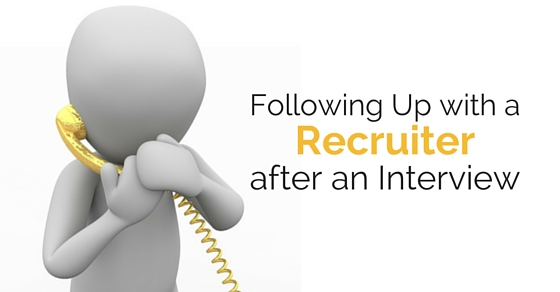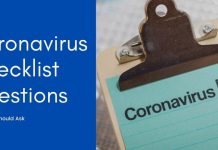After cracking it to the interview round, one might consider it as a big achievement. Because you know out of thousands you have been selected to be interviewed. But this is just a step closer to get that dream job and it does not assure you of getting it. Many times, one might not get the response from the employer after the interview, rather than just giving up it is advisable to try following up with the employer as the last resort. The process of following up with recruiter is extremely crucial, it might get you the job or it might hamper the chances of cracking it. Therefore, it is essential to know when is enough so as not to freak out the employers. The following mentioned are few tips on how to follow up after interview.
 Right Way for Following up with Recruiter:
Right Way for Following up with Recruiter:
1.Sending a thank you note:
The best way to create a chain for job interview follow up emails is through sending a thank you after interview, to the employer. Mention your positive experience during the interview process and how you will be beneficial to the company if in case hired. It will act as a buffer and a reminder for you to send a follow up email to recruiter after interview if in case you do not hear back from the employer.
2. Be organized:
Many times a person tends to attend various interviews and proceeds with simultaneous follow up with the respective recruiters or employers. Being organized in this scenario is the key of avoiding the dreadful error of sending the same email across. For example, if you were supposed to email to recruiter A today and another email to recruiter B after two days, therefore, ensure to put the email id of recruiter A and not B. With so many opportunities opening up, these small errors tend to happen. It is advisable to maintain a log sheet or an excel sheet with the correct details and keep updating it.
3. Send emails first:
Before jumping ahead with a call to know the final answer, it is advisable to send an email first and wait for few days for the response. Many times the employers are busy with their daily office work and tend to delay the process of hiring, hence a well written simple email will be a reminder for them to answer you back. If in case for few days you do not get the response then it is better to get in touch with them through a telephonic conversation.
4. Connect through your network:
If you know someone from the company you went for the interview. Then it is advisable to follow up on interview through that person and receive the feedback. This approach is quite beneficial since the person will be from the company itself, therefore, the awkwardness and tension of asking will be reduced. Also, it increases the possibility of getting a positive response.
5. Avoid the scene of desperation:
Keep in mind there is a thin line between desperation and interest. One need to understand the correct frequency of the interview follow up required if in case it becomes too much the employer might get annoyed and cancel the chance of hiring. For example, if you have not received the response in about ten days time then sending one email will be good enough. Another important thing is to maintain the gap between the another follow-up email. Sending too many emails and calls gives a wrong perception about you.
6. Be professional:
While sending an email ensure to use the correct language with proper grammar and it should be addressed in a professional manner. Even if you felt that you connected with the employer during the interview yet understand that you do not know the employer personally. A well-written follow up letter for job represents you as a very good communicator, hence delivering a positive image of you to the employer.
7. Avoid pestering:
Many times the employers or recruiters are loaded with work and may not respond to your email. Or at times these emails tend to go to their spam folders if this happens then ensure to change your settings. Another case could be that the employer might think you as a good fit for their company, hence they might not respond to your emails. After few follow ups if you do not receive any feedback then it is advisable to move on. Avoid being a stalker to the employer since it might hamper your image in the industry.
8. Check with the recruiter first:
If you applied for the job through a recruiter or a headhunter, then it is best not to directly send the follow-up emails to the employer. Talk to the recruiter and ask for the updates from them. As they are the official source hence they tend to receive a quicker and substantial response from the employer. Also, they are another source of information to let you know if the employer liked you or not.
9. Keep it simple and short:
When sending an email or making a follow call, avoid getting too elaborate or personal. Keep the conversation to the point, crisp and clear. A direct messaging will not only save your time but also portray you as a person who values time and words.
10. Avoid using social media:
With the feasibility of connecting to people through Facebook, Twitter and other modes of social media, one must fully avoid using this as a form of follow-up tool. Because this is invading the personal space of the employer or the recruiter. Always send email on the professional id which is a good example of formal approach towards work.
11. Grammer check:
Always ensure to re-read your email before sending it. If you think you lack the skill of effective grammar or spelling, it is best to use spell check options in the email.We live in the world where communication matters most these days and everyone appreciates a well versed and communicative person. Another point is, the employer might think you as a non-serious person who does not bother checking their emails before sending, hence they might develop second thoughts about you.
12. Address to the right person:
Know who is the right person to whom you require sending an email. Many times mailing it to the person who is not concerned with regards to your hiring process, may not lead you anywhere and the email will land up in the trash. On the other hand, sending an email to the right person increases the opportunity to land up the desired job. Also, keep in mind while addressing to the right person, ensure to use the appropriate title along with the correct designation. For example, ensure to send the follow up to the person involved in your hiring in the HR department.
13. Use the right subject line:
For the recruiter to see your email, it is of utmost important that the person checks and opens it. For this, a correct subject line will be highly beneficial. Avoid mentioning any vague or irrelevant subject line as it may lead to missing out by the recruiter. It is the best advice to use the subject for example as follow for the interview. As this will be easily understood by the recruiter the message the email contains.
14. Update your recruiter:
Building relationships in long term always reap better benefits in future. Hence, if you have already got a job somewhere then it is good to inform your recruiter beforehand about it. As this will reduce the hassle and confusion in future, this will also build your reputation as the trustworthy person, hence if a future opportunity opens up you might be lucky to get that.
15. Keep in touch:
Even after you got the job, keep in touch with your recruiter Since he is the person who was able to guide you to get the best-suited job for you. Many people have the tendency to shut the communication off once they get the job. Career path is not just about work, but it is also about building relationships with people around. Especially those who have helped you to reach those heights. Hence, always be in touch with your recruiter.
The art of following up is a unique process in itself. The correct timing, correct messaging and correct communication increases the chances of landing up in your dream job. Follow up after interview by emails are just another regular step towards getting a job, it is just a way to showcase your pro-activeness to the employer and your enthusiasm towards the company. With the help of above-stated points, one can easily prove their worth without overdoing it.









































